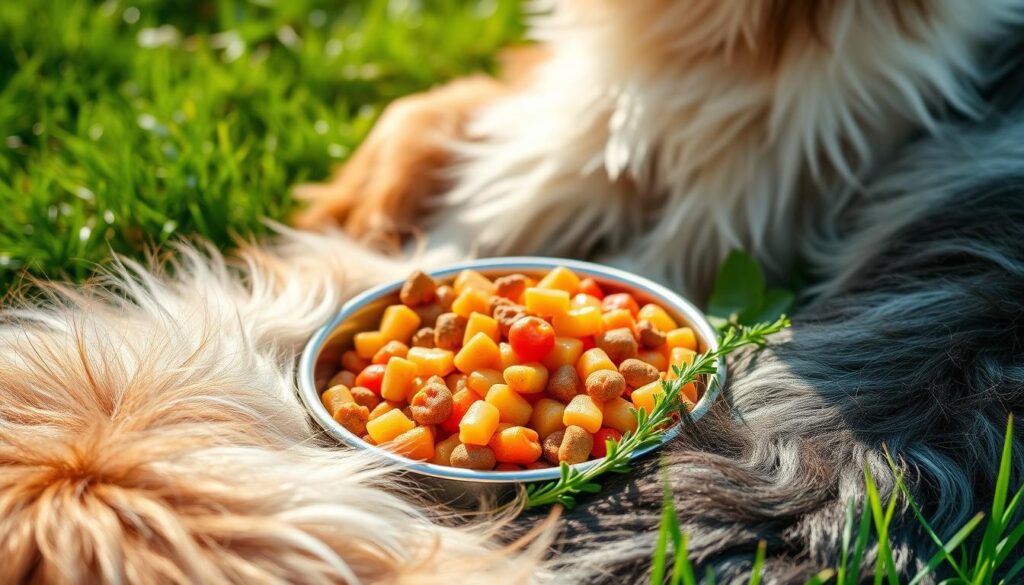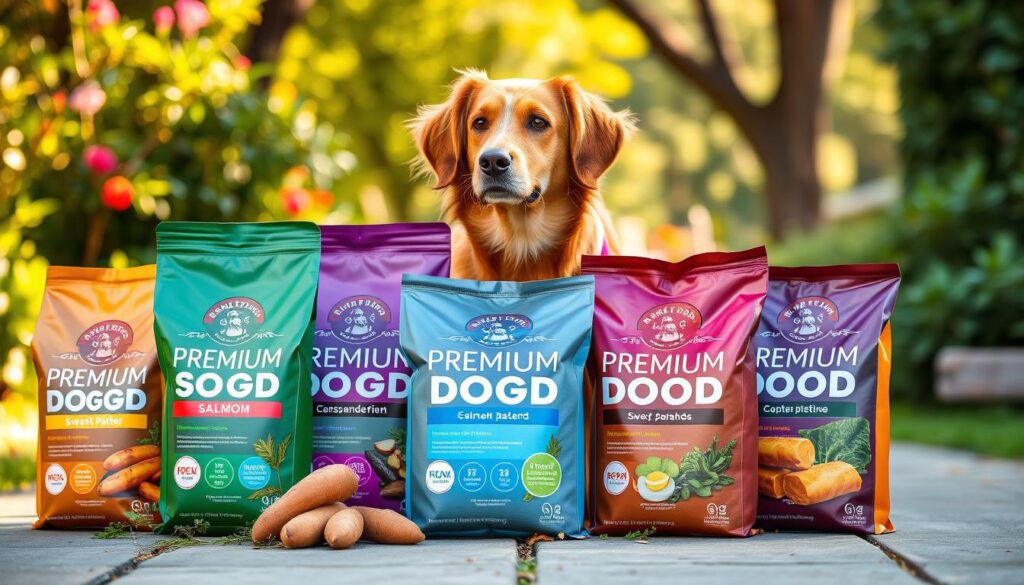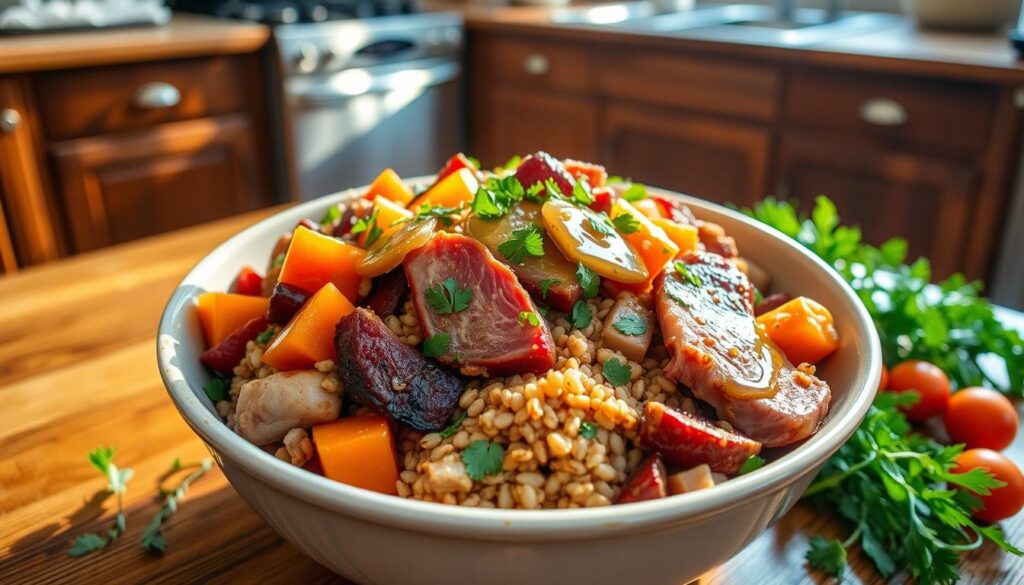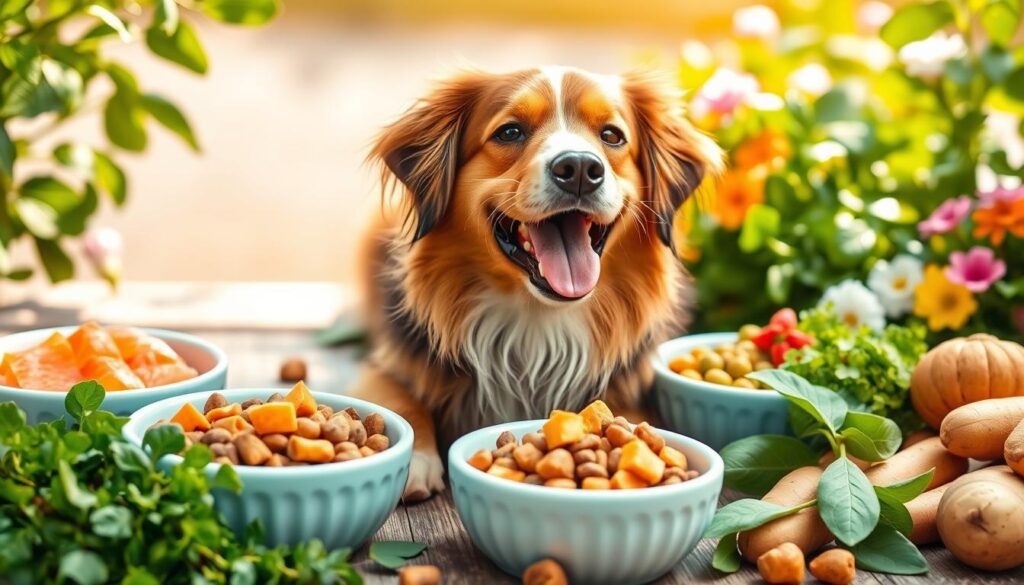Imagine walking through the park with your dog, their coat glistening in the sunlight, drawing compliments from everyone who passes by. This scene might seem like a dream for many dog owners, but it doesn’t have to be.
It all starts with one crucial element: diet. Selecting the right food can be the key to unlocking a shiny and healthy coat. But what is the best dog food for a healthy coat?
This article will explore dog food recommendations that not only improve your dog’s coat appearance but also promote overall skin health. A proper diet rich in essential nutrients plays a pivotal role in contributing to your dog’s coat vitality.
So, let’s dive deep into the best diet for a dog’s coat health and uncover which ingredients pack the most power!
Key Takeaways
- The right diet is essential for promoting a healthy and shiny dog coat.
- Look for dog food with high protein, omega fatty acids, and antioxidants.
- Regular monitoring of your dog’s diet can prevent skin and coat-related issues.
- Consider both commercial and homemade dog food options for optimal coat health.
- Consult with a veterinarian for personalized dog food recommendations.
Understanding the Importance of Dog Coat Health
A dog’s coat serves as a vital indicator of its overall health and well-being. A shiny and healthy coat often reflects a balanced diet that includes essential nutrients. When selecting dog food, it’s crucial to focus on dog food for glossy coat options that provide comprehensive nutrition. Paying attention to both the quality and type of nutrients can greatly influence coat health.
Why Coat Health Matters for Dogs
Maintaining a healthy coat is essential for dogs as it protects them from environmental factors and helps regulate body temperature. Dogs with dry or flaky coats may experience discomfort and be more susceptible to skin conditions. Signs of poor coat health can include excessive shedding, dull appearance, or even skin irritation. A diet formulated with premium dog food for coat health can play a key role in preventing these issues.
Key Nutrients for a Shiny Coat
Specific nutrients are crucial for promoting a shiny and vibrant coat. Omega-3 and Omega-6 fatty acids are particularly important, as they help reduce dryness and enhance coat shine. Vitamins A and E also contribute significantly to skin health, supporting the overall appearance of a dog’s coat. Incorporating high-quality proteins is essential as they build strong skin and hair follicles, ensuring that dogs maintain a full, healthy coat.
Impact of Diet on Skin Conditions
The relationship between diet and skin health is significant. Dogs suffering from skin issues may benefit from limited ingredient diets (LID) or hypoallergenic dog food formulas to minimize allergic reactions. Nutrient-rich foods, which include the best ingredients for dog coat health, such as prebiotics and probiotics, help support gut health and, ultimately, skin health. Additionally, supplements like fish oil and biotin can further enhance coat hydration and shine, particularly in dogs with sensitivities.

Top Ingredients to Look for in Dog Food
When selecting the best dog food for skin allergies and a shiny coat, focusing on top-quality ingredients is essential. A well-balanced diet that includes specific nutrients can significantly enhance a dog’s coat health. This section highlights crucial ingredients to consider for optimal skin and coat conditions.
Omega Fatty Acids
Omega fatty acids are vital for maintaining a shiny coat. They help regulate skin moisture, keeping it hydrated and healthy. Look for dog foods that contain omega-3 and omega-6 fatty acids derived from fish oil, flaxseed, or canola oil. These are often included in recommended dog food for shiny coat options. By incorporating these essential fatty acids, dog owners can support their pets’ overall skin health and glimmering fur.
Antioxidants and Vitamins
Antioxidants play a crucial role in protecting dog skin from oxidative stress. Nutrients such as vitamin E, vitamin A, and various B vitamins are essential for maintaining the health of dog coats. Foods rich in fruits and vegetables, like blueberries and sweet potatoes, provide necessary vitamins and antioxidants. These nutrients help promote and sustain coat luster, making them integral components of the top dog foods for shiny coat. Ensuring dogs receive these vitamins can also help manage skin allergies.
High-Quality Protein Sources
High-quality protein sources are fundamental for healthy skin and a shiny coat. Look for real meat ingredients like chicken, beef, lamb, turkey, and fish. These proteins provide essential amino acids that contribute to coat strength and shine. When selecting the best dog food for skin allergies, prioritize foods that list meat or meat meals as the primary protein source. Proteins derived from eggs can also be beneficial, offering great bioavailability to support skin and coat health.

Reviews of Popular Dog Food Brands for Coat Health
Choosing the right dog food can significantly enhance your pet’s coat appearance and overall health. This section reviews popular brands known for their effective formulations designed to improve coat condition. Highlighting the unique benefits of each brand can aid pet owners in making informed choices. Look for these top-rated dog food for coat condition options that prioritize ingredients to support a shiny and healthy coat.
Royal Canin
Royal Canin specializes in breed-specific formulas that cater to the distinct nutritional needs of dogs. Their offerings include foods enriched with omega-3 and omega-6 fatty acids along with vitamins A and E, essential for maintaining a vibrant coat. Pet food reviews for coat health commend Royal Canin for its focus on optimal ingredient quality, making it one of the best dog foods for shiny coat available.
Nutro Ultra
Nutro Ultra stands out for its high-quality, natural ingredients designed to support healthy skin and coat. With a blend of diverse proteins and antioxidants, this brand promotes not just coat health but overall vitality. The inclusion of essential fatty acids aids in creating a shiny coat. Many consumer pet food reviews for coat health highlight Nutro Ultra as a top choice among dog owners seeking the best nutrition for their pets.
Blue Buffalo
Blue Buffalo prioritizes natural ingredients while eliminating common allergens such as grains and dairy. This hypoallergenic approach reduces the risk of skin irritations and allergies, often seen in sensitive dogs. With omega fatty acids and other nutrients aimed at coat hydration, Blue Buffalo earns its reputation as one of the best dog foods for shiny coat. Owners appreciate the visible difference this brand makes in their dogs’ fur texture and health.
Homemade Dog Food Recipes for a Healthy Coat
Preparing homemade meals for your dog can be a rewarding way to enhance their coat health. The best diet for dog’s coat health often includes nutrient-rich ingredients that promote shine and vitality. Focusing on vitamins and omega fatty acids can transform your pet’s appearance over time. Here, we will highlight some essential ingredients to include along with simple recipes that make it easier for you to provide healthy homemade dog food.
Ingredients to Include
When crafting meals for your dog, certain ingredients stand out for their contribution to a shiny coat. Ideally, you want to enrich their diet with items like ground beef for protein, organs such as hearts and liver for vitamins, and butternut squash for fiber and antioxidants. Incorporating sardines can boost omega-3 fatty acids, promoting skin and coat health. Additionally, leafy greens, eggs, and oysters provide essential nutrients that contribute to overall wellness.
Simple Recipes You Can Try at Home
Creating your dog’s meals can be simple and effective. One popular recipe yields about 6 cups of food, suitable for a dog weighing around 45 pounds for three days. A combination of ground beef, butternut squash, and broccoli delivers essential vitamins and healthy fats. Another option is mixing sardines with leafy greens, egg, and flax oil for a nutritious boost.
Remember that the amount of homemade dog food required varies with your dog’s weight and activity level. Leftovers can be stored in an airtight container in the refrigerator for up to one week or in the freezer for up to three months, making it easy to prepare in advance.

The nutritional benefits outlined, combined with consistent efforts in preparing healthy homemade dog food, can lead to visible improvements in your dog’s coat health. For more insights on setting meaningful goals in life as well, you can check out this resource on life goals.
Common Myths About Dog Food and Coat Health
Misconceptions about dog food and their effects on coat health can mislead dog owners into making less informed choices. Understanding the truth behind these myths is essential for providing the best nutrition for a glossy coat and overall well-being. Two areas often clouded by myth are the role of protein in a diet and the impacts of grain-free diets on skin health.
Debunking Protein Myths
A common misconception is that high-protein diets are the sole contributors to a glossy coat. While protein is indeed an important component for dog food, quality matters more than quantity. Dogs can benefit from high biological value protein sources like eggs, which produce fewer waste products, potentially leading to better overall health. Moreover, an overly high protein intake has sparked debates regarding its potential links to kidney issues. It’s critical for pet owners to be aware that while protein is necessary, balance is crucial. An appropriate blend of nutrients will effectively support coat health and overall vitality.
Understanding Grain-Free Diets
Another prevalent myth suggests that grain-free diets are inherently superior for dog health. The reality reveals that grains can provide essential nutrients and are well-tolerated by many dogs. Recent investigations by the FDA have pointed to potential risks, including the impacts of grain-free diets on skin health, such as a concerning link to heart disease. Emphasizing that grains, in moderation, can contribute to a balanced diet, pet owners should focus on their dog’s individual needs rather than conforming to trends. Choosing the right dog food for a glossy coat goes beyond popular notions and requires understanding what fits best with each dog’s unique health profile.
How to Transition to New Dog Food
Changing a dog’s diet requires careful consideration to ensure a smooth transition while enhancing coat health. Gradually introducing new food can prevent gastrointestinal upset, while observing your dog’s reactions helps identify any negative effects. Following best practices for changing dog food makes this process easier and beneficial in the long run.
Steps for a Smooth Transition
Start by mixing a small amount of the new food with the current food. On day one, incorporate 25% of the new dog food, gradually increasing it to 50% by day three, 75% by day five, and finally reaching 100% on day seven. Some dogs with sensitive stomachs may need a longer transition period. It is essential to monitor your dog’s health throughout this process.
Monitoring Your Dog’s Reaction
Observe your dog’s reaction during the transition period. Keep an eye on their coat health, digestion, and overall behavior. Signs of adverse food reactions can include gastrointestinal disturbances, changes in energy levels, or alterations in the coat’s texture. If any symptoms appear, it may be necessary to revert to the old diet and consult with a veterinarian. Regularly assessing your dog’s condition helps ensure the new diet promotes optimal health.
Tips for Maintaining a Healthy Coat Beyond Diet
Maintaining a healthy coat is not solely about what your dog eats; it also involves essential daily care practices. Regular grooming is one of the most effective dog coat care tips. Brushing your dog helps to remove dead hair and dander, while also distributing natural oils that contribute to a shiny and healthy coat. For breeds with long or thick fur, grooming for healthy-coated dogs is particularly important to prevent matting and skin irritations.
Equally important is ensuring your dog stays hydrated. Water plays a crucial role in preserving skin elasticity and overall coat quality. Adequate hydration supports the absorption of vital nutrients such as omega-3 and omega-6 fatty acids, which are known for enhancing coat shine and texture. Consider integrating supplements like fish oil for a boost in hydration and coat luster.
Regular veterinary check-ups are fundamental to monitor your dog’s coat health and identify any potential skin issues early. These appointments allow for professional veterinary advice for dog coat health, including tailored nutritional adjustments that may benefit your pet based on their coat color and specific needs. For instance, golden and red-coated dogs may thrive on beta carotene-rich foods. To explore the benefits of vitamin-rich diets, check out this informative resource on Vitamin A and its importance for your dog’s.











